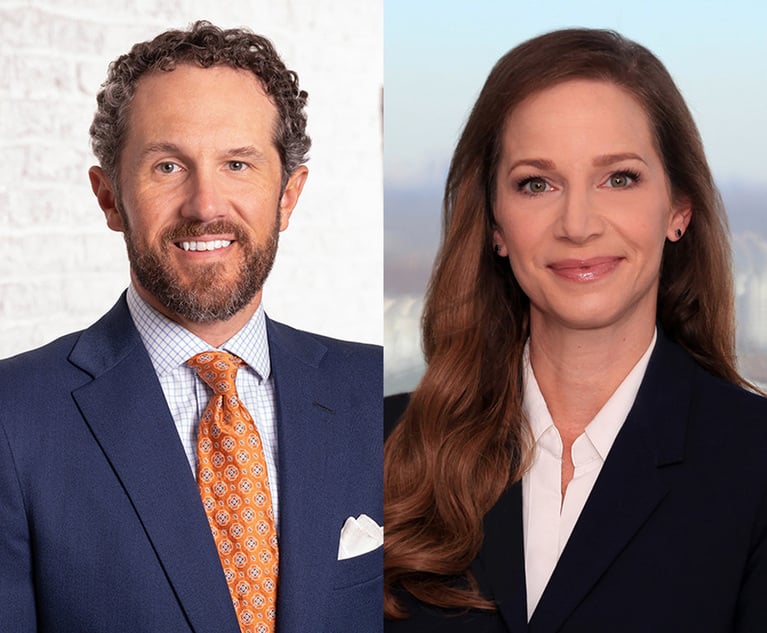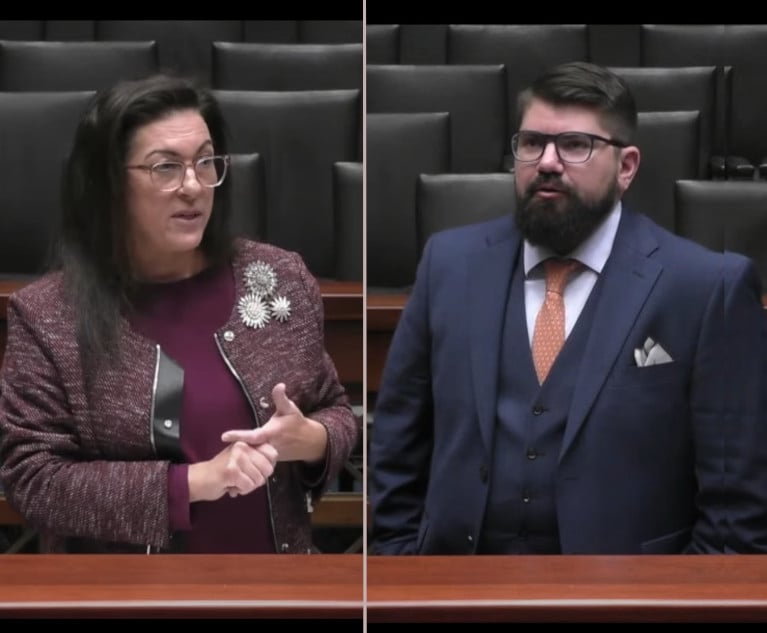Increased Standardization Would Benefit the Global Anti-Corruption Effort
For the past six years Walmart has been working to enhance its global ethics and compliance program, with a specific focus on anti-corruption.
December 01, 2017 at 12:00 AM
5 minute read

For the past six years Walmart has been working to enhance its global ethics and compliance program, with a specific focus on anti-corruption. Today more than 110 employees work full time on Walmart's anti-corruption efforts, including screening potential business partners, providing training, answering questions and monitoring our business.
Walmart and other companies have expressed interest in certifying their anti-corruption compliance programs under the new ISO standard 37001. See Microsoft and Wal-Mart seek ISO 37001 Anti-Bribery Certification. That standard “provides guidance for establishing, implementing and reviewing an anti-bribery management system” either as a stand-alone effort or as part of a company's broader ethics and compliance program. ISO 37001:2016. Several anti-corruption experts have asked me why Walmart is interested in ISO certification. In light of the guidance that different governments and commentators have provided regarding the elements of an effective compliance system and Walmart's investments to enhance its program, surely Walmart doesn't need to take the steps the ISO standard specifies?
I believe Walmart has already implemented the recommendations embodied in the ISO standard. But the fact that Walmart has already implemented an effective program doesn't make the ISO standard irrelevant. To the contrary, promoting increased standardization of corporate anti-corruption efforts would benefit everyone who is working against the plague of corruption.
Increased clarity encourages action Not every company has an anti-corruption program. In fact, Walmart's experience suggests that many businesses around the world lack a meaningful anti-bribery management system. What would prompt those companies to adopt new governance practices? For smaller businesses or companies in developing markets, an easy-to-understand catalog of the steps required to implement an anti-corruption program will encourage action. People are more likely to act if it's clear what they're supposed to do.
While a number of governmental agencies have provided guidance on how compliance programs should be structured, businesses often don't adopt recommendations of a government that is not their own. Anti-corruption programs bring costs and, if they work well, can steer businesses away from some lucrative (but high-risk) opportunities. Justifying these costs to owners and shareholders is more difficult when the reason for action is that some distant government has asked its citizens to comply. In fact, those who work in the anti-corruption space know that companies frequently object to the application of standards like the U.S. Foreign Corrupt Practices Act or the U.K. Bribery Act because they see these laws as irrelevant to their operations. We should move past these types of jurisdictional concerns as quickly as possible to focus on the anti-corruption work that needs to be done. The ISO standard has the benefit of belonging to no single nation: Experts from 61 countries and seven liaison organizations were involved in the committee that created the standard. As a result, the ISO standard could hasten the spread of effective anti-corruption practices. Walmart wants to lead by example in this effort.
For large, sophisticated companies the recommendations of the ISO standard are like a foundation. Walmart is utilizing additional processes that customize our anti-corruption efforts to our business, and we will continue to innovate. But a clear, global standard will help us encourage business partners around the world to do more by way of anti-corruption, which will only decrease our own risks.
A certification system could improve due diligence and training One problem with the current state of anti-corruption compliance is that each company conducts its own due diligence on prospective business partners. Many companies also provide certain partners with anti-corruption training. These efforts are vitally important. Many corruption cases arise from the activities of third parties who specialize in interacting with government officials. As a result, an effective compliance program must screen proposed third-party intermediaries and promote a high level of anti-corruption awareness among those that are selected for projects.
However, there's an enormous amount of duplication and waste in this system. As an example, since 2013, Walmart has spent more than $22 million on screening, monitoring, and educating third parties who interact with governments on our behalf. During this time, it seems likely that many other companies who considered doing business with these same service providers conducted their own due diligence, not knowing that Walmart had already subjected the prospective partner to review. The same is true for anti-corruption training. Walmart has a robust process for educating third-party intermediaries. I suspect that many of the service providers who receive Walmart's training get similar training from other clients.
The ISO 37001 certification process provides an opportunity to reduce this waste and thereby make additional resources available for other anti-corruption efforts. If a company that provides third-party intermediary services develops an anti-corruption program and receives certification under ISO 37001, that independent verification should provide prospective clients with more assurance than is currently available through standard due diligence.
Since an ongoing anti-bribery training curriculum is part of the ISO standard, certification could also lessen or eliminate the need for that company to complete multiple different trainings issued by various clients. The time and money saved by not repeating the same checks and training would then be available for use with entities that have not achieved independent certification of their anti-bribery efforts.
Walmart wants to work with other businesses to prevent corruption everywhere we do business. The ISO 37001 standard provides companies with an opportunity to join our efforts and do just that.
Jay T. Jorgensen is the global chief ethics and compliance officer of Walmart Stores Inc. Before joining Walmart, he was a partner at Sidley Austin LLP and a judicial clerk to United States Supreme Court Chief Justice William H. Rehnquist and Judge Samuel A. Alito on the United States Court of Appeals for the Third Circuit.
This content has been archived. It is available through our partners, LexisNexis® and Bloomberg Law.
To view this content, please continue to their sites.
Not a Lexis Subscriber?
Subscribe Now
Not a Bloomberg Law Subscriber?
Subscribe Now
NOT FOR REPRINT
© 2025 ALM Global, LLC, All Rights Reserved. Request academic re-use from www.copyright.com. All other uses, submit a request to [email protected]. For more information visit Asset & Logo Licensing.
You Might Like
View All
Houston Appeals Court Split Over Race Discrimination Suit Involving COVID-19 Vaccine Distribution
4 minute read
Overtime Rewind: Texas Court Ruling Unravels FLSA Salary Level Increases
4 minute read
'It's Like They Lynched You:' Law Professor's Discrimination Claim Reaches High Court
7 minute readTrending Stories
- 1Thursday Newspaper
- 2Public Notices/Calendars
- 3Judicial Ethics Opinion 24-117
- 4Rejuvenation of a Sharp Employer Non-Compete Tool: Delaware Supreme Court Reinvigorates the Employee Choice Doctrine
- 5Mastering Litigation in New York’s Commercial Division Part V, Leave It to the Experts: Expert Discovery in the New York Commercial Division
Who Got The Work
J. Brugh Lower of Gibbons has entered an appearance for industrial equipment supplier Devco Corporation in a pending trademark infringement lawsuit. The suit, accusing the defendant of selling knock-off Graco products, was filed Dec. 18 in New Jersey District Court by Rivkin Radler on behalf of Graco Inc. and Graco Minnesota. The case, assigned to U.S. District Judge Zahid N. Quraishi, is 3:24-cv-11294, Graco Inc. et al v. Devco Corporation.
Who Got The Work
Rebecca Maller-Stein and Kent A. Yalowitz of Arnold & Porter Kaye Scholer have entered their appearances for Hanaco Venture Capital and its executives, Lior Prosor and David Frankel, in a pending securities lawsuit. The action, filed on Dec. 24 in New York Southern District Court by Zell, Aron & Co. on behalf of Goldeneye Advisors, accuses the defendants of negligently and fraudulently managing the plaintiff's $1 million investment. The case, assigned to U.S. District Judge Vernon S. Broderick, is 1:24-cv-09918, Goldeneye Advisors, LLC v. Hanaco Venture Capital, Ltd. et al.
Who Got The Work
Attorneys from A&O Shearman has stepped in as defense counsel for Toronto-Dominion Bank and other defendants in a pending securities class action. The suit, filed Dec. 11 in New York Southern District Court by Bleichmar Fonti & Auld, accuses the defendants of concealing the bank's 'pervasive' deficiencies in regards to its compliance with the Bank Secrecy Act and the quality of its anti-money laundering controls. The case, assigned to U.S. District Judge Arun Subramanian, is 1:24-cv-09445, Gonzalez v. The Toronto-Dominion Bank et al.
Who Got The Work
Crown Castle International, a Pennsylvania company providing shared communications infrastructure, has turned to Luke D. Wolf of Gordon Rees Scully Mansukhani to fend off a pending breach-of-contract lawsuit. The court action, filed Nov. 25 in Michigan Eastern District Court by Hooper Hathaway PC on behalf of The Town Residences LLC, accuses Crown Castle of failing to transfer approximately $30,000 in utility payments from T-Mobile in breach of a roof-top lease and assignment agreement. The case, assigned to U.S. District Judge Susan K. Declercq, is 2:24-cv-13131, The Town Residences LLC v. T-Mobile US, Inc. et al.
Who Got The Work
Wilfred P. Coronato and Daniel M. Schwartz of McCarter & English have stepped in as defense counsel to Electrolux Home Products Inc. in a pending product liability lawsuit. The court action, filed Nov. 26 in New York Eastern District Court by Poulos Lopiccolo PC and Nagel Rice LLP on behalf of David Stern, alleges that the defendant's refrigerators’ drawers and shelving repeatedly break and fall apart within months after purchase. The case, assigned to U.S. District Judge Joan M. Azrack, is 2:24-cv-08204, Stern v. Electrolux Home Products, Inc.
Featured Firms
Law Offices of Gary Martin Hays & Associates, P.C.
(470) 294-1674
Law Offices of Mark E. Salomone
(857) 444-6468
Smith & Hassler
(713) 739-1250







